Psychological Contract Breach: Management's Role and Impact
VerifiedAdded on 2019/12/18
|7
|1959
|433
Essay
AI Summary
This essay delves into the concept of psychological contracts in the workplace, which are unwritten agreements between employees and their managers concerning expectations, obligations, and rewards. It explores how these contracts can be breached, leading to negative consequences such as decreased employee engagement, reduced productivity, and damaged relationships. The essay examines the inherent subjectivity of these contracts, highlighting the challenges managers face in preventing breaches or minimizing their effects. It argues that due to the implicit nature of psychological contracts and the varying interpretations of individuals, breaches are often inevitable. While managers can strive to improve communication and transparency, the essay suggests that they have limited control over employee perceptions and expectations, making complete prevention of breaches difficult. The essay also discusses the importance of understanding employee needs and aligning them with organizational goals, emphasizing the complexity of addressing the psychological aspects of the employment relationship.
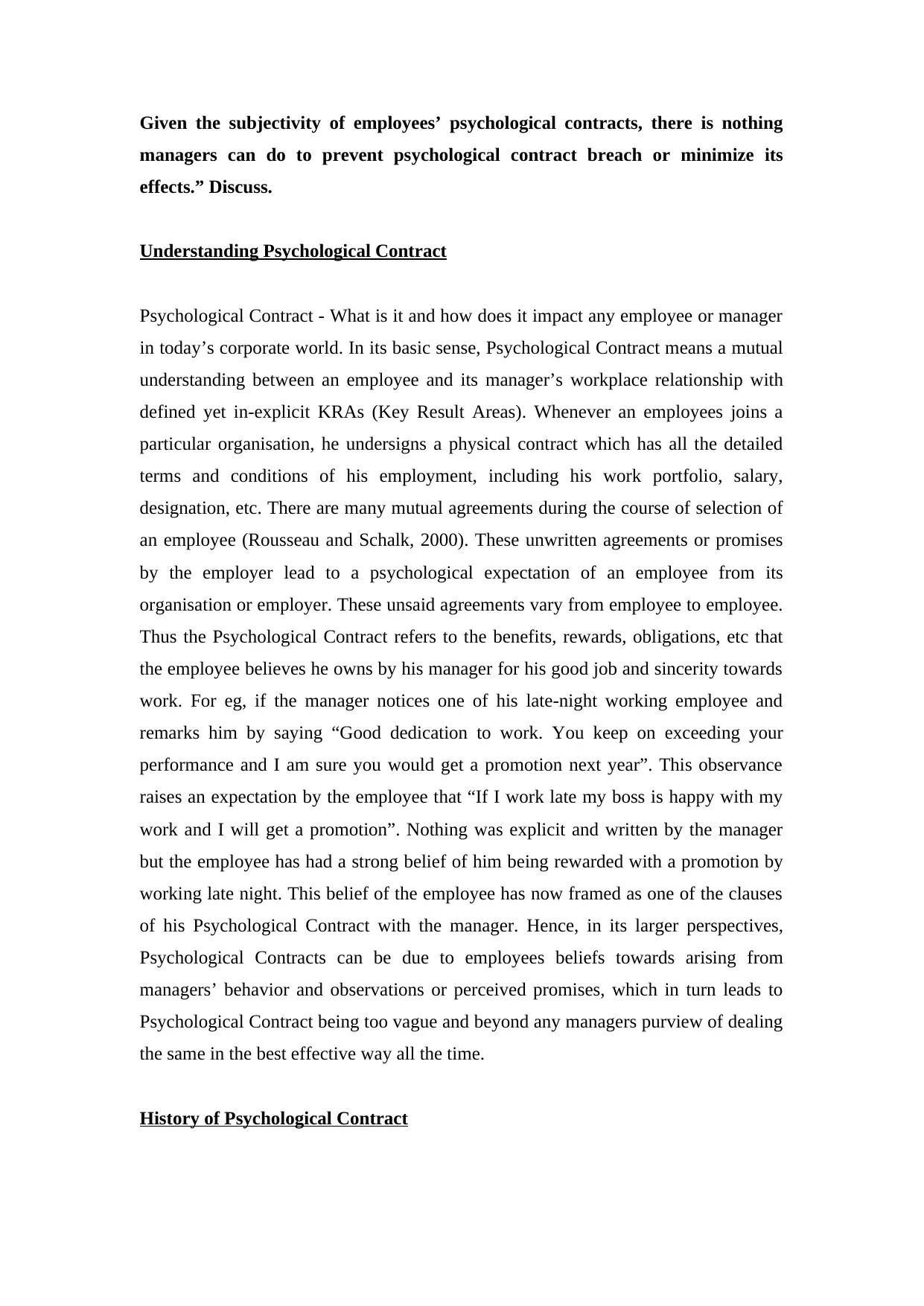
Given the subjectivity of employees’ psychological contracts, there is nothing
managers can do to prevent psychological contract breach or minimize its
effects.” Discuss.
Understanding Psychological Contract
Psychological Contract - What is it and how does it impact any employee or manager
in today’s corporate world. In its basic sense, Psychological Contract means a mutual
understanding between an employee and its manager’s workplace relationship with
defined yet in-explicit KRAs (Key Result Areas). Whenever an employees joins a
particular organisation, he undersigns a physical contract which has all the detailed
terms and conditions of his employment, including his work portfolio, salary,
designation, etc. There are many mutual agreements during the course of selection of
an employee (Rousseau and Schalk, 2000). These unwritten agreements or promises
by the employer lead to a psychological expectation of an employee from its
organisation or employer. These unsaid agreements vary from employee to employee.
Thus the Psychological Contract refers to the benefits, rewards, obligations, etc that
the employee believes he owns by his manager for his good job and sincerity towards
work. For eg, if the manager notices one of his late-night working employee and
remarks him by saying “Good dedication to work. You keep on exceeding your
performance and I am sure you would get a promotion next year”. This observance
raises an expectation by the employee that “If I work late my boss is happy with my
work and I will get a promotion”. Nothing was explicit and written by the manager
but the employee has had a strong belief of him being rewarded with a promotion by
working late night. This belief of the employee has now framed as one of the clauses
of his Psychological Contract with the manager. Hence, in its larger perspectives,
Psychological Contracts can be due to employees beliefs towards arising from
managers’ behavior and observations or perceived promises, which in turn leads to
Psychological Contract being too vague and beyond any managers purview of dealing
the same in the best effective way all the time.
History of Psychological Contract
managers can do to prevent psychological contract breach or minimize its
effects.” Discuss.
Understanding Psychological Contract
Psychological Contract - What is it and how does it impact any employee or manager
in today’s corporate world. In its basic sense, Psychological Contract means a mutual
understanding between an employee and its manager’s workplace relationship with
defined yet in-explicit KRAs (Key Result Areas). Whenever an employees joins a
particular organisation, he undersigns a physical contract which has all the detailed
terms and conditions of his employment, including his work portfolio, salary,
designation, etc. There are many mutual agreements during the course of selection of
an employee (Rousseau and Schalk, 2000). These unwritten agreements or promises
by the employer lead to a psychological expectation of an employee from its
organisation or employer. These unsaid agreements vary from employee to employee.
Thus the Psychological Contract refers to the benefits, rewards, obligations, etc that
the employee believes he owns by his manager for his good job and sincerity towards
work. For eg, if the manager notices one of his late-night working employee and
remarks him by saying “Good dedication to work. You keep on exceeding your
performance and I am sure you would get a promotion next year”. This observance
raises an expectation by the employee that “If I work late my boss is happy with my
work and I will get a promotion”. Nothing was explicit and written by the manager
but the employee has had a strong belief of him being rewarded with a promotion by
working late night. This belief of the employee has now framed as one of the clauses
of his Psychological Contract with the manager. Hence, in its larger perspectives,
Psychological Contracts can be due to employees beliefs towards arising from
managers’ behavior and observations or perceived promises, which in turn leads to
Psychological Contract being too vague and beyond any managers purview of dealing
the same in the best effective way all the time.
History of Psychological Contract
Paraphrase This Document
Need a fresh take? Get an instant paraphrase of this document with our AI Paraphraser
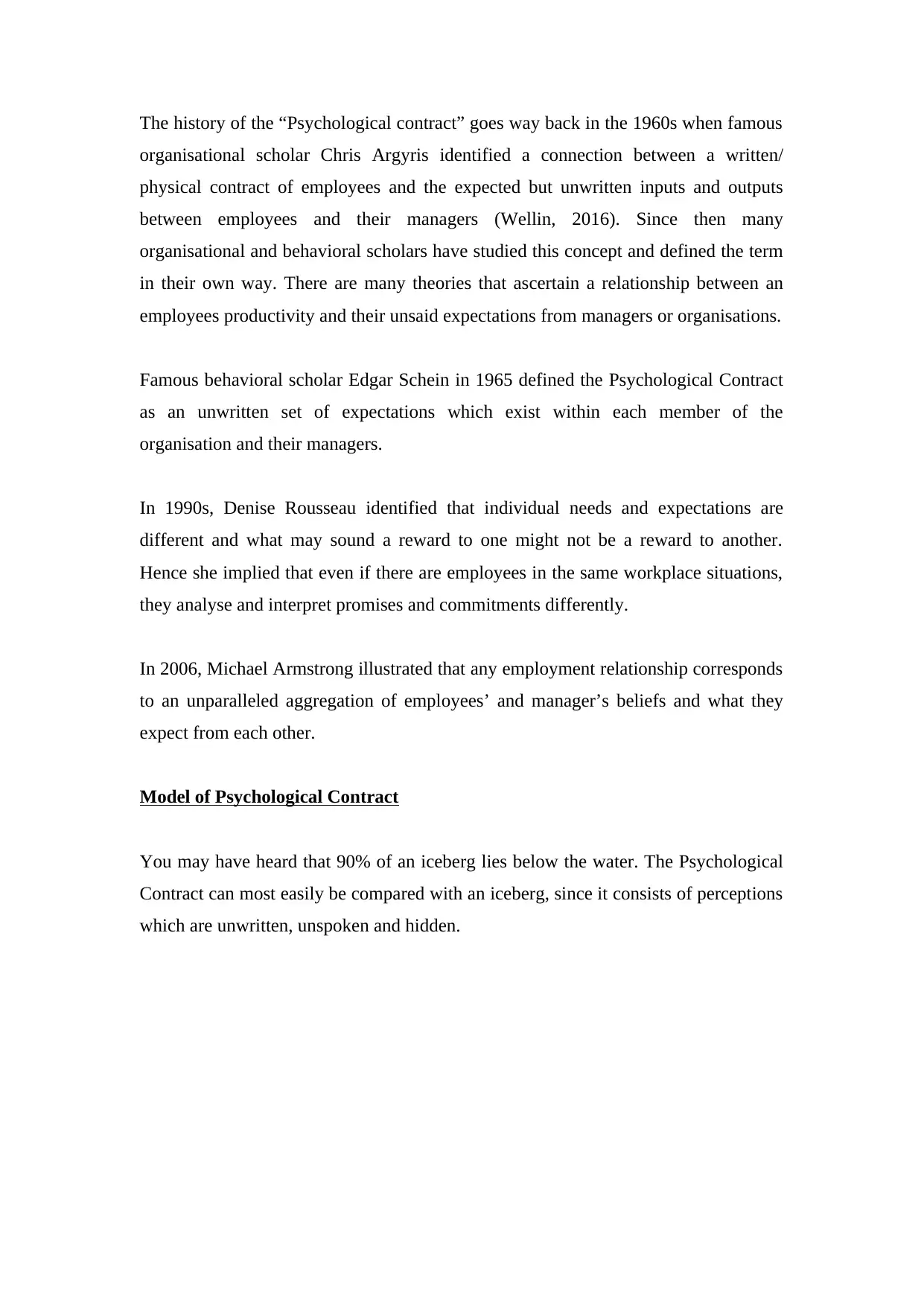
The history of the “Psychological contract” goes way back in the 1960s when famous
organisational scholar Chris Argyris identified a connection between a written/
physical contract of employees and the expected but unwritten inputs and outputs
between employees and their managers (Wellin, 2016). Since then many
organisational and behavioral scholars have studied this concept and defined the term
in their own way. There are many theories that ascertain a relationship between an
employees productivity and their unsaid expectations from managers or organisations.
Famous behavioral scholar Edgar Schein in 1965 defined the Psychological Contract
as an unwritten set of expectations which exist within each member of the
organisation and their managers.
In 1990s, Denise Rousseau identified that individual needs and expectations are
different and what may sound a reward to one might not be a reward to another.
Hence she implied that even if there are employees in the same workplace situations,
they analyse and interpret promises and commitments differently.
In 2006, Michael Armstrong illustrated that any employment relationship corresponds
to an unparalleled aggregation of employees’ and manager’s beliefs and what they
expect from each other.
Model of Psychological Contract
You may have heard that 90% of an iceberg lies below the water. The Psychological
Contract can most easily be compared with an iceberg, since it consists of perceptions
which are unwritten, unspoken and hidden.
organisational scholar Chris Argyris identified a connection between a written/
physical contract of employees and the expected but unwritten inputs and outputs
between employees and their managers (Wellin, 2016). Since then many
organisational and behavioral scholars have studied this concept and defined the term
in their own way. There are many theories that ascertain a relationship between an
employees productivity and their unsaid expectations from managers or organisations.
Famous behavioral scholar Edgar Schein in 1965 defined the Psychological Contract
as an unwritten set of expectations which exist within each member of the
organisation and their managers.
In 1990s, Denise Rousseau identified that individual needs and expectations are
different and what may sound a reward to one might not be a reward to another.
Hence she implied that even if there are employees in the same workplace situations,
they analyse and interpret promises and commitments differently.
In 2006, Michael Armstrong illustrated that any employment relationship corresponds
to an unparalleled aggregation of employees’ and manager’s beliefs and what they
expect from each other.
Model of Psychological Contract
You may have heard that 90% of an iceberg lies below the water. The Psychological
Contract can most easily be compared with an iceberg, since it consists of perceptions
which are unwritten, unspoken and hidden.
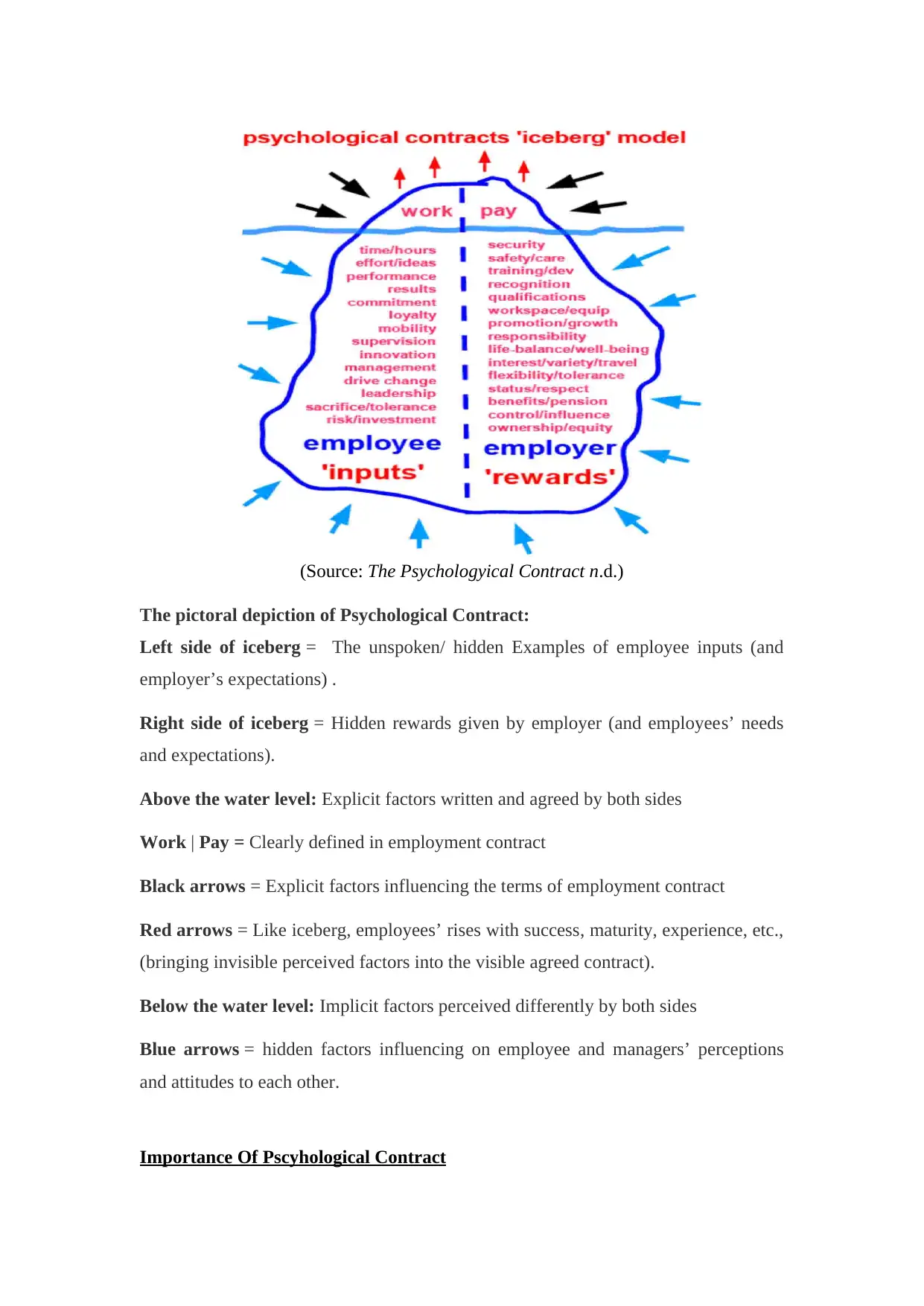
(Source: The Psychologyical Contract n.d.)
The pictoral depiction of Psychological Contract:
Left side of iceberg = The unspoken/ hidden Examples of employee inputs (and
employer’s expectations) .
Right side of iceberg = Hidden rewards given by employer (and employees’ needs
and expectations).
Above the water level: Explicit factors written and agreed by both sides
Work | Pay = Clearly defined in employment contract
Black arrows = Explicit factors influencing the terms of employment contract
Red arrows = Like iceberg, employees’ rises with success, maturity, experience, etc.,
(bringing invisible perceived factors into the visible agreed contract).
Below the water level: Implicit factors perceived differently by both sides
Blue arrows = hidden factors influencing on employee and managers’ perceptions
and attitudes to each other.
Importance Of Pscyhological Contract
The pictoral depiction of Psychological Contract:
Left side of iceberg = The unspoken/ hidden Examples of employee inputs (and
employer’s expectations) .
Right side of iceberg = Hidden rewards given by employer (and employees’ needs
and expectations).
Above the water level: Explicit factors written and agreed by both sides
Work | Pay = Clearly defined in employment contract
Black arrows = Explicit factors influencing the terms of employment contract
Red arrows = Like iceberg, employees’ rises with success, maturity, experience, etc.,
(bringing invisible perceived factors into the visible agreed contract).
Below the water level: Implicit factors perceived differently by both sides
Blue arrows = hidden factors influencing on employee and managers’ perceptions
and attitudes to each other.
Importance Of Pscyhological Contract
⊘ This is a preview!⊘
Do you want full access?
Subscribe today to unlock all pages.

Trusted by 1+ million students worldwide
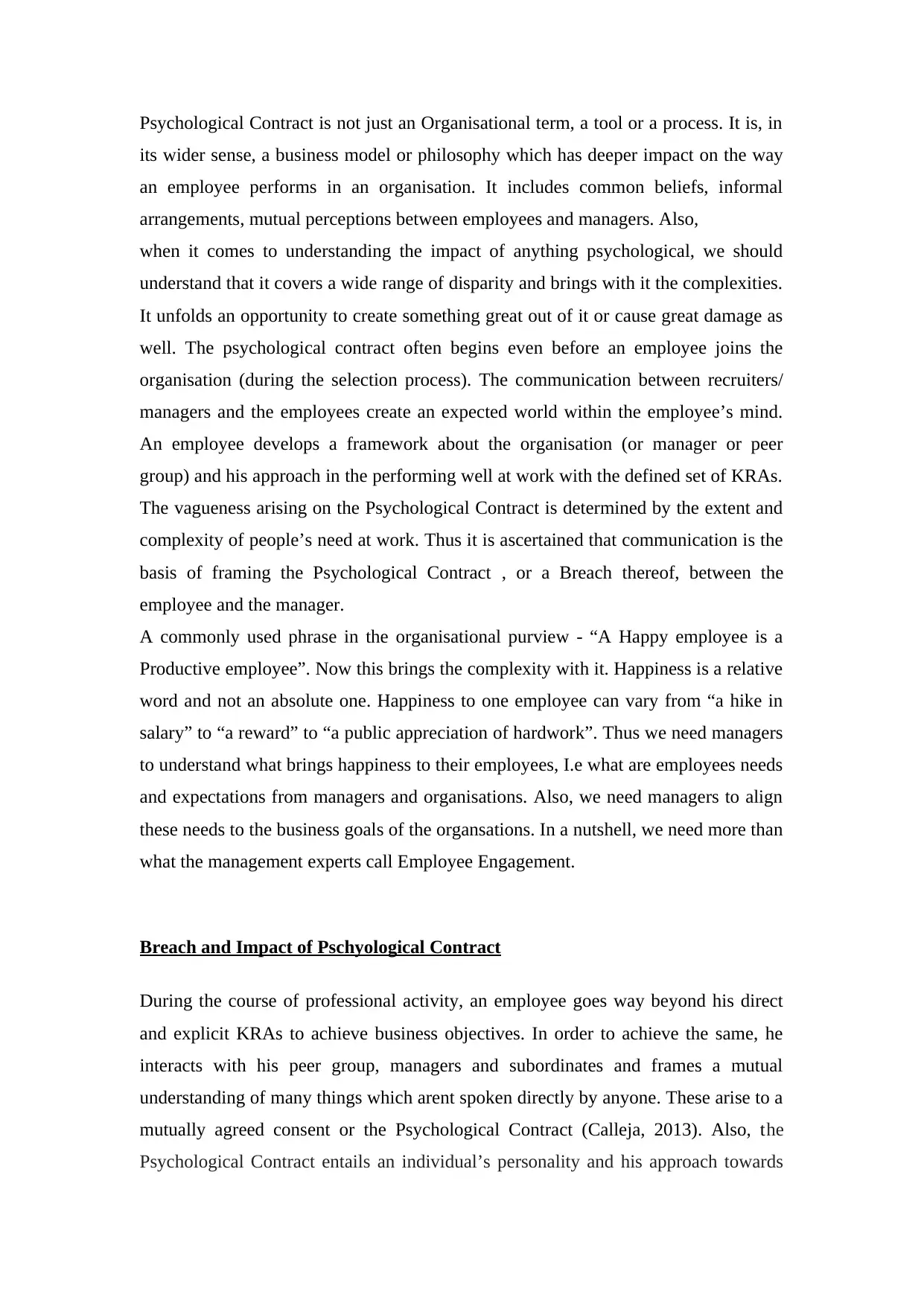
Psychological Contract is not just an Organisational term, a tool or a process. It is, in
its wider sense, a business model or philosophy which has deeper impact on the way
an employee performs in an organisation. It includes common beliefs, informal
arrangements, mutual perceptions between employees and managers. Also,
when it comes to understanding the impact of anything psychological, we should
understand that it covers a wide range of disparity and brings with it the complexities.
It unfolds an opportunity to create something great out of it or cause great damage as
well. The psychological contract often begins even before an employee joins the
organisation (during the selection process). The communication between recruiters/
managers and the employees create an expected world within the employee’s mind.
An employee develops a framework about the organisation (or manager or peer
group) and his approach in the performing well at work with the defined set of KRAs.
The vagueness arising on the Psychological Contract is determined by the extent and
complexity of people’s need at work. Thus it is ascertained that communication is the
basis of framing the Psychological Contract , or a Breach thereof, between the
employee and the manager.
A commonly used phrase in the organisational purview - “A Happy employee is a
Productive employee”. Now this brings the complexity with it. Happiness is a relative
word and not an absolute one. Happiness to one employee can vary from “a hike in
salary” to “a reward” to “a public appreciation of hardwork”. Thus we need managers
to understand what brings happiness to their employees, I.e what are employees needs
and expectations from managers and organisations. Also, we need managers to align
these needs to the business goals of the organsations. In a nutshell, we need more than
what the management experts call Employee Engagement.
Breach and Impact of Pschyological Contract
During the course of professional activity, an employee goes way beyond his direct
and explicit KRAs to achieve business objectives. In order to achieve the same, he
interacts with his peer group, managers and subordinates and frames a mutual
understanding of many things which arent spoken directly by anyone. These arise to a
mutually agreed consent or the Psychological Contract (Calleja, 2013). Also, the
Psychological Contract entails an individual’s personality and his approach towards
its wider sense, a business model or philosophy which has deeper impact on the way
an employee performs in an organisation. It includes common beliefs, informal
arrangements, mutual perceptions between employees and managers. Also,
when it comes to understanding the impact of anything psychological, we should
understand that it covers a wide range of disparity and brings with it the complexities.
It unfolds an opportunity to create something great out of it or cause great damage as
well. The psychological contract often begins even before an employee joins the
organisation (during the selection process). The communication between recruiters/
managers and the employees create an expected world within the employee’s mind.
An employee develops a framework about the organisation (or manager or peer
group) and his approach in the performing well at work with the defined set of KRAs.
The vagueness arising on the Psychological Contract is determined by the extent and
complexity of people’s need at work. Thus it is ascertained that communication is the
basis of framing the Psychological Contract , or a Breach thereof, between the
employee and the manager.
A commonly used phrase in the organisational purview - “A Happy employee is a
Productive employee”. Now this brings the complexity with it. Happiness is a relative
word and not an absolute one. Happiness to one employee can vary from “a hike in
salary” to “a reward” to “a public appreciation of hardwork”. Thus we need managers
to understand what brings happiness to their employees, I.e what are employees needs
and expectations from managers and organisations. Also, we need managers to align
these needs to the business goals of the organsations. In a nutshell, we need more than
what the management experts call Employee Engagement.
Breach and Impact of Pschyological Contract
During the course of professional activity, an employee goes way beyond his direct
and explicit KRAs to achieve business objectives. In order to achieve the same, he
interacts with his peer group, managers and subordinates and frames a mutual
understanding of many things which arent spoken directly by anyone. These arise to a
mutually agreed consent or the Psychological Contract (Calleja, 2013). Also, the
Psychological Contract entails an individual’s personality and his approach towards
Paraphrase This Document
Need a fresh take? Get an instant paraphrase of this document with our AI Paraphraser
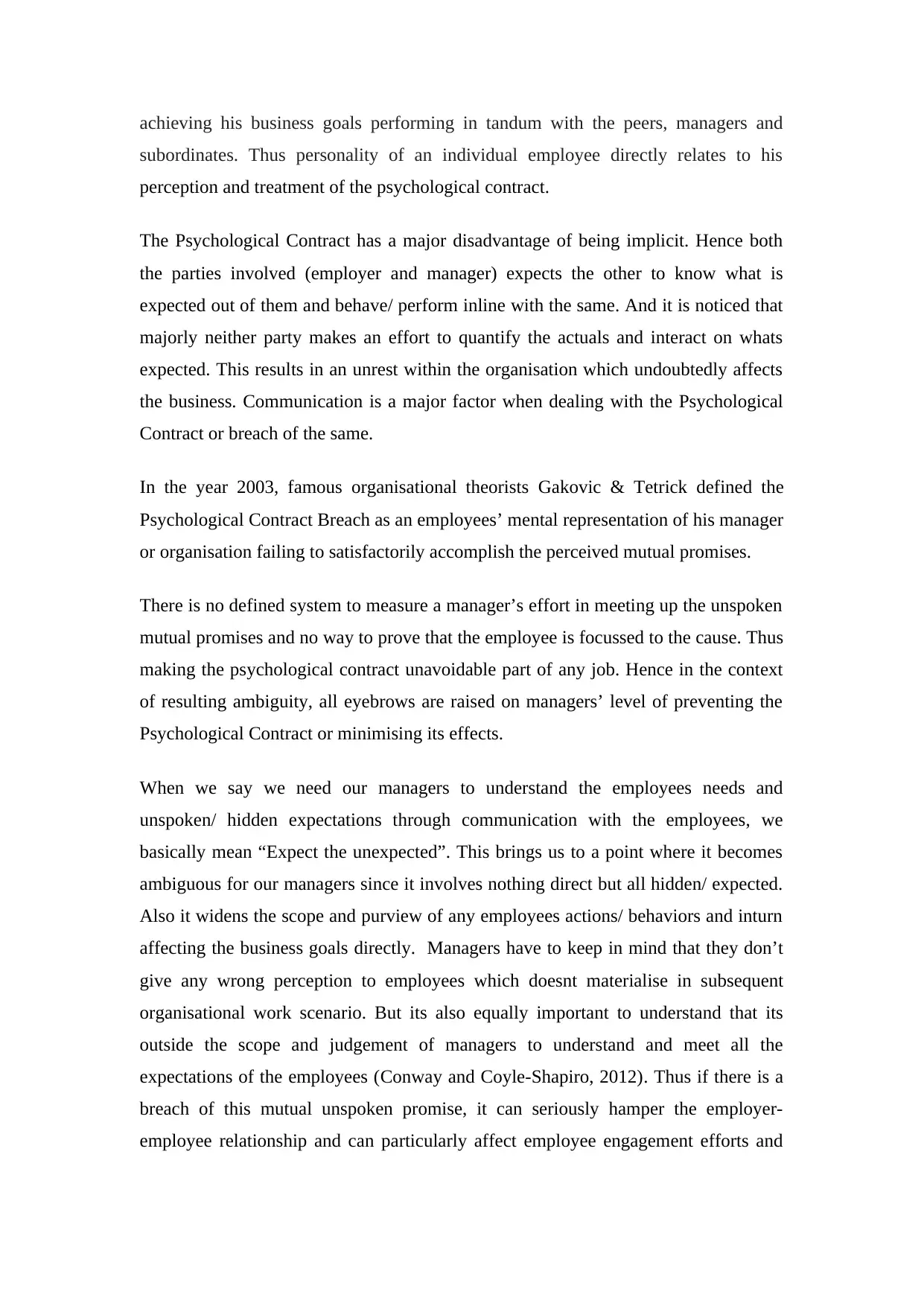
achieving his business goals performing in tandum with the peers, managers and
subordinates. Thus personality of an individual employee directly relates to his
perception and treatment of the psychological contract.
The Psychological Contract has a major disadvantage of being implicit. Hence both
the parties involved (employer and manager) expects the other to know what is
expected out of them and behave/ perform inline with the same. And it is noticed that
majorly neither party makes an effort to quantify the actuals and interact on whats
expected. This results in an unrest within the organisation which undoubtedly affects
the business. Communication is a major factor when dealing with the Psychological
Contract or breach of the same.
In the year 2003, famous organisational theorists Gakovic & Tetrick defined the
Psychological Contract Breach as an employees’ mental representation of his manager
or organisation failing to satisfactorily accomplish the perceived mutual promises.
There is no defined system to measure a manager’s effort in meeting up the unspoken
mutual promises and no way to prove that the employee is focussed to the cause. Thus
making the psychological contract unavoidable part of any job. Hence in the context
of resulting ambiguity, all eyebrows are raised on managers’ level of preventing the
Psychological Contract or minimising its effects.
When we say we need our managers to understand the employees needs and
unspoken/ hidden expectations through communication with the employees, we
basically mean “Expect the unexpected”. This brings us to a point where it becomes
ambiguous for our managers since it involves nothing direct but all hidden/ expected.
Also it widens the scope and purview of any employees actions/ behaviors and inturn
affecting the business goals directly. Managers have to keep in mind that they don’t
give any wrong perception to employees which doesnt materialise in subsequent
organisational work scenario. But its also equally important to understand that its
outside the scope and judgement of managers to understand and meet all the
expectations of the employees (Conway and Coyle-Shapiro, 2012). Thus if there is a
breach of this mutual unspoken promise, it can seriously hamper the employer-
employee relationship and can particularly affect employee engagement efforts and
subordinates. Thus personality of an individual employee directly relates to his
perception and treatment of the psychological contract.
The Psychological Contract has a major disadvantage of being implicit. Hence both
the parties involved (employer and manager) expects the other to know what is
expected out of them and behave/ perform inline with the same. And it is noticed that
majorly neither party makes an effort to quantify the actuals and interact on whats
expected. This results in an unrest within the organisation which undoubtedly affects
the business. Communication is a major factor when dealing with the Psychological
Contract or breach of the same.
In the year 2003, famous organisational theorists Gakovic & Tetrick defined the
Psychological Contract Breach as an employees’ mental representation of his manager
or organisation failing to satisfactorily accomplish the perceived mutual promises.
There is no defined system to measure a manager’s effort in meeting up the unspoken
mutual promises and no way to prove that the employee is focussed to the cause. Thus
making the psychological contract unavoidable part of any job. Hence in the context
of resulting ambiguity, all eyebrows are raised on managers’ level of preventing the
Psychological Contract or minimising its effects.
When we say we need our managers to understand the employees needs and
unspoken/ hidden expectations through communication with the employees, we
basically mean “Expect the unexpected”. This brings us to a point where it becomes
ambiguous for our managers since it involves nothing direct but all hidden/ expected.
Also it widens the scope and purview of any employees actions/ behaviors and inturn
affecting the business goals directly. Managers have to keep in mind that they don’t
give any wrong perception to employees which doesnt materialise in subsequent
organisational work scenario. But its also equally important to understand that its
outside the scope and judgement of managers to understand and meet all the
expectations of the employees (Conway and Coyle-Shapiro, 2012). Thus if there is a
breach of this mutual unspoken promise, it can seriously hamper the employer-
employee relationship and can particularly affect employee engagement efforts and
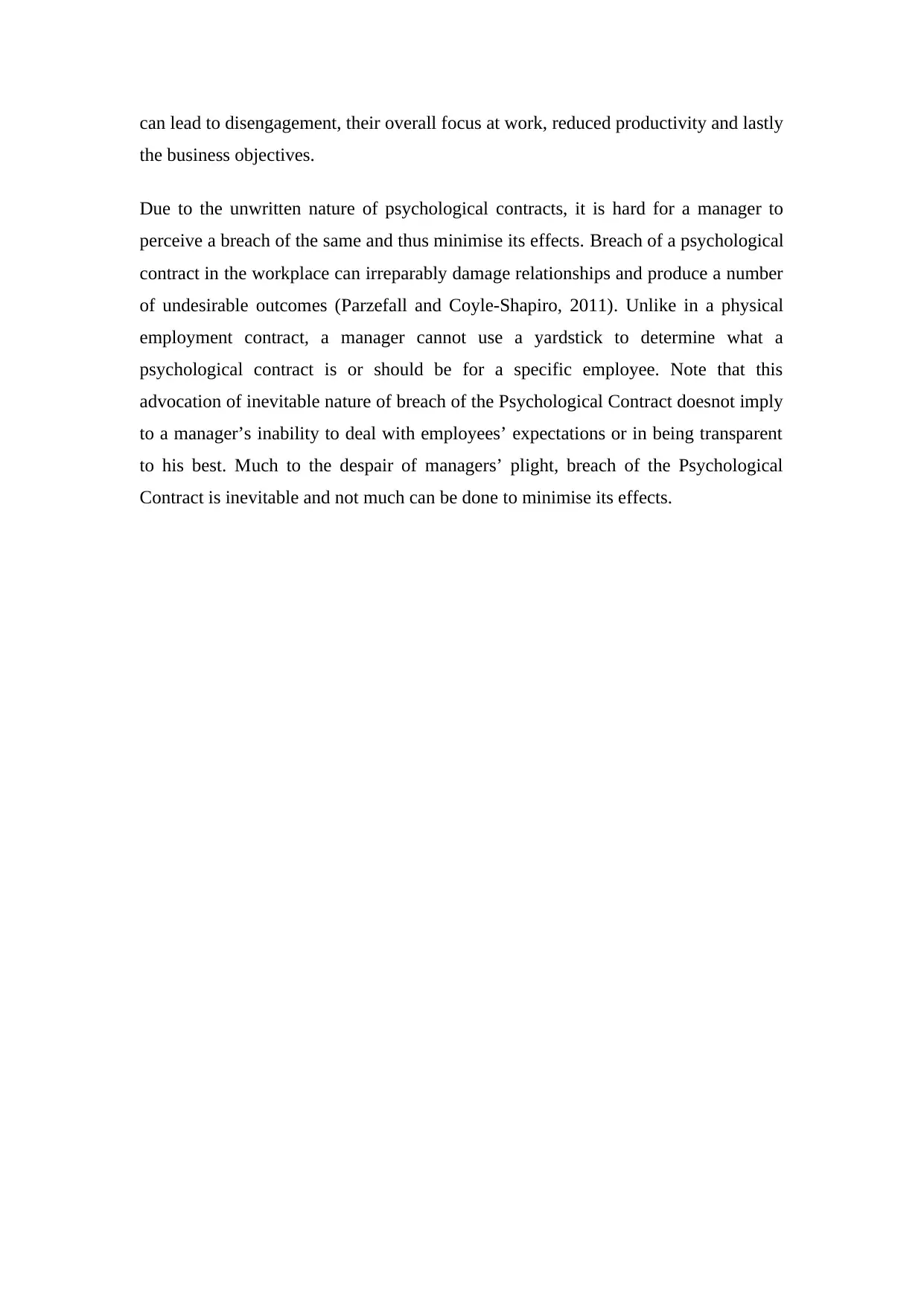
can lead to disengagement, their overall focus at work, reduced productivity and lastly
the business objectives.
Due to the unwritten nature of psychological contracts, it is hard for a manager to
perceive a breach of the same and thus minimise its effects. Breach of a psychological
contract in the workplace can irreparably damage relationships and produce a number
of undesirable outcomes (Parzefall and Coyle-Shapiro, 2011). Unlike in a physical
employment contract, a manager cannot use a yardstick to determine what a
psychological contract is or should be for a specific employee. Note that this
advocation of inevitable nature of breach of the Psychological Contract doesnot imply
to a manager’s inability to deal with employees’ expectations or in being transparent
to his best. Much to the despair of managers’ plight, breach of the Psychological
Contract is inevitable and not much can be done to minimise its effects.
the business objectives.
Due to the unwritten nature of psychological contracts, it is hard for a manager to
perceive a breach of the same and thus minimise its effects. Breach of a psychological
contract in the workplace can irreparably damage relationships and produce a number
of undesirable outcomes (Parzefall and Coyle-Shapiro, 2011). Unlike in a physical
employment contract, a manager cannot use a yardstick to determine what a
psychological contract is or should be for a specific employee. Note that this
advocation of inevitable nature of breach of the Psychological Contract doesnot imply
to a manager’s inability to deal with employees’ expectations or in being transparent
to his best. Much to the despair of managers’ plight, breach of the Psychological
Contract is inevitable and not much can be done to minimise its effects.
⊘ This is a preview!⊘
Do you want full access?
Subscribe today to unlock all pages.

Trusted by 1+ million students worldwide
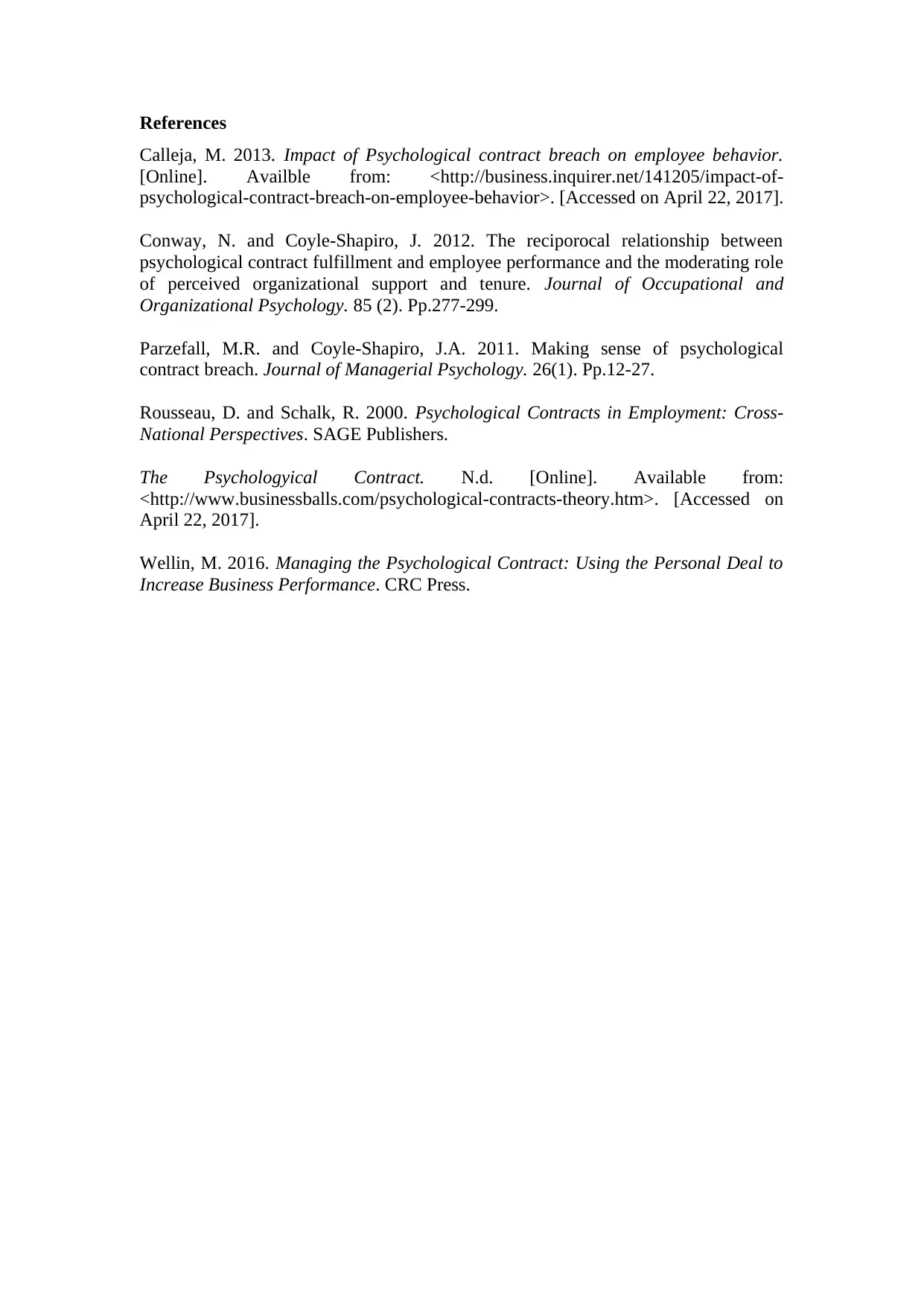
References
Calleja, M. 2013. Impact of Psychological contract breach on employee behavior.
[Online]. Availble from: <http://business.inquirer.net/141205/impact-of-
psychological-contract-breach-on-employee-behavior>. [Accessed on April 22, 2017].
Conway, N. and Coyle-Shapiro, J. 2012. The reciporocal relationship between
psychological contract fulfillment and employee performance and the moderating role
of perceived organizational support and tenure. Journal of Occupational and
Organizational Psychology. 85 (2). Pp.277-299.
Parzefall, M.R. and Coyle-Shapiro, J.A. 2011. Making sense of psychological
contract breach. Journal of Managerial Psychology. 26(1). Pp.12-27.
Rousseau, D. and Schalk, R. 2000. Psychological Contracts in Employment: Cross-
National Perspectives. SAGE Publishers.
The Psychologyical Contract. N.d. [Online]. Available from:
<http://www.businessballs.com/psychological-contracts-theory.htm>. [Accessed on
April 22, 2017].
Wellin, M. 2016. Managing the Psychological Contract: Using the Personal Deal to
Increase Business Performance. CRC Press.
Calleja, M. 2013. Impact of Psychological contract breach on employee behavior.
[Online]. Availble from: <http://business.inquirer.net/141205/impact-of-
psychological-contract-breach-on-employee-behavior>. [Accessed on April 22, 2017].
Conway, N. and Coyle-Shapiro, J. 2012. The reciporocal relationship between
psychological contract fulfillment and employee performance and the moderating role
of perceived organizational support and tenure. Journal of Occupational and
Organizational Psychology. 85 (2). Pp.277-299.
Parzefall, M.R. and Coyle-Shapiro, J.A. 2011. Making sense of psychological
contract breach. Journal of Managerial Psychology. 26(1). Pp.12-27.
Rousseau, D. and Schalk, R. 2000. Psychological Contracts in Employment: Cross-
National Perspectives. SAGE Publishers.
The Psychologyical Contract. N.d. [Online]. Available from:
<http://www.businessballs.com/psychological-contracts-theory.htm>. [Accessed on
April 22, 2017].
Wellin, M. 2016. Managing the Psychological Contract: Using the Personal Deal to
Increase Business Performance. CRC Press.
1 out of 7
Related Documents
Your All-in-One AI-Powered Toolkit for Academic Success.
+13062052269
info@desklib.com
Available 24*7 on WhatsApp / Email
![[object Object]](/_next/static/media/star-bottom.7253800d.svg)
Unlock your academic potential
Copyright © 2020–2025 A2Z Services. All Rights Reserved. Developed and managed by ZUCOL.





